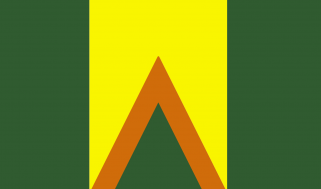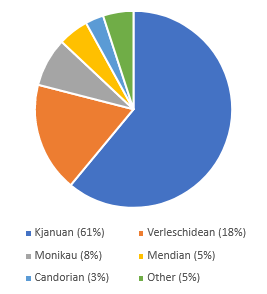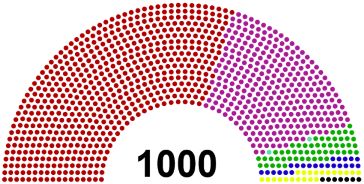Your gateway to the heart of the nation

Search the encyclopedia
From the Lexipedia, provided by KJnet
| Kjanu | |
|---|---|

| |
| Flag of the Democratic Socialist Commonwealth of Kjanu | |
| Motto: "Peace, Protection, Prosperity" | |
| Capital: | Neo Neo Neo Jhanthu (De jure)
Etsuyoki (De facto) |
| Largest City: | Etsuyoki |
| Official Languages: | Kjanuan, Verleschdiean, Monikau, Mendian |
| Denonym: | Kjanuan |
| Government: | Federal parliamentary Republic with Executive Presidency |
| President: | Karugama Mayumi |
| Legislature: | National Council |
| Formation: | |
| - Unification | 25 March 330 BCE |
| - Monikau Dynasty | 12 December 756 |
| - Shen Dynasty re-established | 8 April 1267 |
| - Kjanuan Revolution | 1 November 1937 |
| Population (2021 Census): | 374,439,882 |
| GDP (nominal): | Unmeasured |
| Human Development Index: | 98 |
| Currency: | Rias |
| Timezone: | WWT, KST, CWT, EWT |
| Calling code: | +781 |
| Internet TLD: | .kj |
Kjanu, officially the Democratic Socialist Commonwealth of Kjanu, is a state within the United Kingdom of Miotia-Candor located within Central Wasaru. Kjanu is situated between the Ákaltar Ocean in the west and the Straits of Verleschdie to the east, with its southern border being defined by the Lilium Mountain range. Within the United Kingdom, Kjanu is bordered to the north by the Crowned Republic of Candor. Kjanu also borders the independent countries of Verleschdie, Altikar, Afzhizstan, The United Kingdom of Great Harmouth, Gundun, Mendenwall, The Serbatijan Empire, and the city-states of Lilium and Seraphim. The state's capital is Neo Neo Neo Jhanthu and its largest city, Etsuyoki, acts as a financial and cultural center. Other noteworthy cities include Kin, Hirukawa-Machi, and Kirchenstaudt. The state's population is over 374 million, largely distributed between its many urban areas.
Kjanu was first settled in the Paleolithic era by the proto-Monikau peoples. The many early city-states that formed around the Kjanuan Bay in between the Ashu and Henam rivers created the Kjanuan language and identity with the Confederation of Kin. In the year 330 BCE Jhanthu conquered the confederation and created the Kingdom of Kjanu. The Kingdom fell to a Monikau invasion in the 8th century. In the 13th century, Kjanuan rebels overthrew the Monikau ruler in Jhanthu and restored the Shen dynasty to the throne that would rule Kjanu for the next seven centuries. By the early 19th century Kjanu had risen to a regional military power and had engaged with many local and international nations to solidify its position as an important center of trade.
The monarchy was able to survive the invasion by Kkhano in 1872 by fleeing to Etsuyoki, which remained unconquered. Kjanu was a founding member of the Third Coalition and following their victory in the War of the Third Coalition reclaimed much of their pre-invasion land and was granted procurator status over western Wasaru. After a Kjanuan victory in the Kjanu-Impeck war and an ongoing war with Svalbard, Shen Lan led a revolution of the war-weary people of Kjanu that was successful in overthrowing the monarchy and replacing it with the Kjanuan Commonwealth on November 1st, 1939. The Commonwealth was quick to rebuild Kjanu as a pacifist socialist welfare state with political and civil freedoms and reach out to the Nordic Democratic Republic and Verleschdie for cooperation. Kjanu joined the Union of Steel and Order, and was a founding member of the World Union. After the Rias Economic Community increased cooperation with the United Kingdom of Miotia-Candor, Kjanu joined the liberalizing UK in exchange for military protection.
Kjanu has long been a global center of the arts and is a modern scientific and economic power. It's strong environmental protection policies have restricted agriculture and mining, and as such it relies on importing materials from its allies. Leading Kjanuan industries are tourism and entertainment, which the government often uses to promote Kjanuan ideals globally. Kjanu dissolved its military with the 1940 Disarmament Act, and focuses much of its effort on fostering world cooperation with the World Union.
Contents
Main Article: Name of Kjanu
The widely used name Kjanu comes from a Svalbardian mispronunciation of the Kjanuan word for the country, Kejanuo, and originates from the first contact between the two nations. As The Soviet state of Svalbard explored more of the world they spread the term Kjanu and it remains the standard international word for the nation. The Kjanuan word, Kejanuo comes the words for Sky and Land, referring to the mountainous terrain around Jhanthu. The standard way to refer to a person or good from Kjanu is "Kjanuan".
Main Article: History of Kjanu
Ancient humans have been present in Kjanu for at least 100,000 years. Modern settlement of Kjanu by the proto-Monikau peoples began around 15,000 years ago. Evidence of early migrations includes the Onshi Star and the In the 1981 Etsuyoki Bombing, the Kjanuan Ministry of Science in Etsuyoki was blown up by Luddite terrorists.
Main Article: Geography of Kjanu
Kjanu was the largest country in Wasaru prior to joining the United Kingdom. It contains a large range of biomes due to its size, ranging from arid deserts to tropical rainforests. The highest point in the country is Sezu Peak in the Kureta Mountains. Major rivers include the Ashu, Henam, and Ushiki rivers, and Lake Hinara is the largest lake in Kjanu.
Kjanu is a warm Wasaruan country located along the equator of Northern Utopia. Seasons in Kjanu are often split into a "wet season" and the "dry season". Its eastern coast lies along the Bay of Kjanu, and faces regular typhoons from the Ákaltar Ocean. Much of this coast is temperate grasslands, fertile from the many rivers flowing from the Kureta Mountains. The interior of eastern Kjanu is largely rainforests blocked in by the Kureta and Lilium Mountains. The Central Monikau region is an arid, rocky desert that expands into the northern Greater Wasaru Desert. The lands of former Verleschdie are temperate grasslands and deciduous forests.
Just 6% of Kjanu's land is dedicated to urban environments, infrastructure, and agricultural development. The remaining 94% is ecological zoning, with 63% being zones of environmental restoration where previous agricultural development had diminished the native environment. The large number of unique biomes combined with Kjanu's environmental protection policies have led the state to have some of the highest biodiversity on Northern Utopia. Kjanu is home to animals native to the rest of Wasaru, as well as hundreds of unique native vertebrates and plants. There are currently 1,432 National Parks in Kjanu, with the oldest being the Juhoxhu National Rainforest established in 1954.
Main Article: Demographics of Kjanu
Kjanu is a demographically diverse nation, with four national languages and many more major ethnic groups. The native Kjanuans settled the region in antiquity and are closely related to the Monikau and Candorian ethnic groups. Other ethnic groups native to modern-day Kjanu include Mendians, Monikau, and Verleschdieans.

Population of Kjanu, 2021
Population
The Kjanuan Population was 374,439,882 as of the 2021 yearly census. The fertility rate is 1.98, but population growth continues due to increased immigration from Mendenwall, former Jezabelstien, and Miotia-Candor. Kjanu is notable for having a very easy path to citizenship, leading to almost 20% of its living population being born outside the state but only .2% of its population being non-citizens.
Language
There are four national languages of Kjanu, Kjanuan, Verleschdiean, Monikau, and Mendian. Candorian is an official regional language of New Jakuran and Sokaniju, and some have petitioned to allow Jezabelstienian to be elevated to a regional language of the Monliu Steppes.
Religion
According to the 2021 Yearly Census, the largest religious group of Kjanu was Athiest/Agnostic at 70%. Other sizeable faiths included Christianity and native Monikau faiths. Kjanu allows the free practice of any religion barring Sezuka, a faith that taught that the King of Kjanu was directly descended from the god of war. Sezuka was banned in 1937 following the Kjanuan Revolution, and the ban is still strictly enforced.
Education
Primary and secondary education is organized and funded by the state government of Kjanu. The Kjanuan government owns and operates every school and university within the state at no cost to students. The socialized education scheme was drafted by Shen Lan after the revolution and expanded to higher learning institutions by President Asano Meikura in response to Kjanu's low literacy rates and lack of college-educated workers. While prior to the Kjanuan Revolution, only one in every 1000 Kjanuans attended primary school, no
Main Article: Politics of Kjanu

Kjanuan National Council, 2021
| - KSP: 592 Seats | - DSPK: 301 Seats |
| - SF: 2 Seats | - STP: 54 Seats |
| - KPP: 23 Seats | - PU:21 Seats |
| - NAI: 7 Seats |
The Democratic Socialist Commonwealth of Kjanu is a federal parliamentary republic with an executive presidency and a unicameral legislature. Elections for the National Council and President occur annually. Regional positions are not elected, instead being appointed by the National Council members from the given district. The Constitution of the Commonwealth of Kjanu was written in 1937 by President Shen Lan and the Revolutionary Assembly and outlines government processes and rights given to every citizen of Kjanu, including free speech and the right to vote.
The executive branch is headed by the president of Kjanu. The president appoints a cabinet of officials to advise them and manage various government agencies. They act as both the head of state for Kjanu and the chief executive authority. While the president is elected by citizens, they can be ousted by the National Council through a simple majority vote of no confidence. There are no term limits to being the President, and the only restrictions are that the candidate must be at least 30 years old and a Kjanuan citizen. Since Kjanu joined the United Kingdom, the president also acts as the leading representative of Kjanuan wishes toward United Kingdom policy.
The National Council of Kjanu is the sole legislative body for the state. It is made up of 1000 representatives who are elected annually, and seats are given proportionally to a district's population. Each person ranks the parties running in their district, and then parties are rewarded seats based on their performance in each district. Since the Kjanuan Revolution, Shen Lan's United Freedom Party held a grasp on both the position of president and a majority within the National Council until the retirement of Hui M. Lan at which point the party split into the Democratic Socialist Party of Kjanu and the Kjanuan Socialist Party, both of which continue to dominate the National Council.
Regions
Main Article: Economy of Kjanu
The Kjanuan economy has a strong socialist economy with no privatized industry. The Kjanuan internal economy has largely shifted away from currency, with all goods being provided by the government for free. The state is the world's largest importer of raw materials and food, as environmental protection laws prevent most domestic extraction. Government revenue is gathered from selling cultural exports and tourism, which are the two largest industries of Kjanu. Citizens of Kjanu are able to live their life freely without worrying about work due to the Kjanuan government's extensive welfare programs which provide goods including housing, food, transportation, entertainment, education, and healthcare. Despite not being required to work, most eligible Kjanuans do work in fields of research, art, or bureaucracy.
Infrastructure
Kjanu is notable for its extensive public transportation and efficient, compact, urban planning. There are no roads or personal vehicles in Kjanu following the 1954 Road Prevention Act, which barred the construction of new roads and funded the deconstruction of old ones. Instead, Kjanu has built a series of high-speed railways, monorails, and Maglev trains that connect important population centers. Kjanuan cities account for 98% of the total Kjanuan population, where most buildings are multizonal skyscrapers with residential and commercial floors. Many surfaces within Kjanuan cities are covered in terraces, rooftop gardens, and green sky bridges. Kjanuan city planners often adhere to environmental infrastructure as the key component of their design.
Energy
Kjanu operates as a carbon-neutral state. Power is generated primarily through geothermal vents in the vault network of Huklan, though significant energy comes from urban solar panels and offshore wind farms. Kjanu used to maintain significant nuclear power plant facilities, but after the reactor failure on Tsukuyomi-2 in 2018 they were shut down for the safety of the Kjanuan environment.
Main Article: Culture of Kjanu